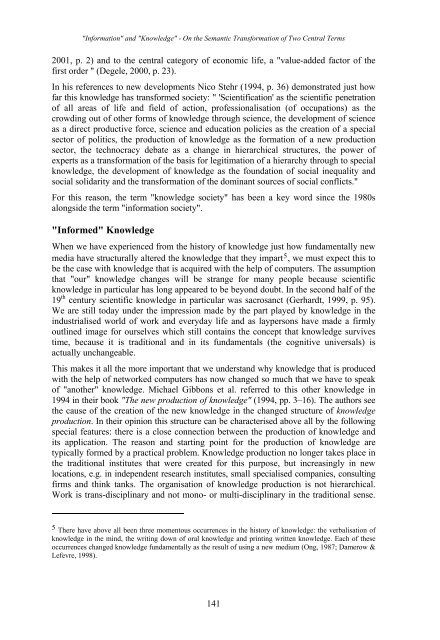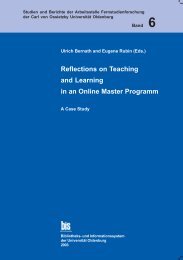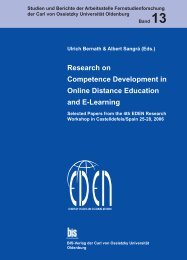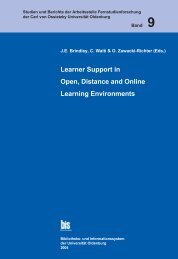Distance Education in Transition - Master of Distance Education ...
Distance Education in Transition - Master of Distance Education ...
Distance Education in Transition - Master of Distance Education ...
You also want an ePaper? Increase the reach of your titles
YUMPU automatically turns print PDFs into web optimized ePapers that Google loves.
"Information" and "Knowledge" - On the Semantic Transformation <strong>of</strong> Two Central Terms<br />
2001, p. 2) and to the central category <strong>of</strong> economic life, a "value-added factor <strong>of</strong> the<br />
first order " (Degele, 2000, p. 23).<br />
In his references to new developments Nico Stehr (1994, p. 36) demonstrated just how<br />
far this knowledge has transformed society: " 'Scientification' as the scientific penetration<br />
<strong>of</strong> all areas <strong>of</strong> life and field <strong>of</strong> action, pr<strong>of</strong>essionalisation (<strong>of</strong> occupations) as the<br />
crowd<strong>in</strong>g out <strong>of</strong> other forms <strong>of</strong> knowledge through science, the development <strong>of</strong> science<br />
as a direct productive force, science and education policies as the creation <strong>of</strong> a special<br />
sector <strong>of</strong> politics, the production <strong>of</strong> knowledge as the formation <strong>of</strong> a new production<br />
sector, the technocracy debate as a change <strong>in</strong> hierarchical structures, the power <strong>of</strong><br />
experts as a transformation <strong>of</strong> the basis for legitimation <strong>of</strong> a hierarchy through to special<br />
knowledge, the development <strong>of</strong> knowledge as the foundation <strong>of</strong> social <strong>in</strong>equality and<br />
social solidarity and the transformation <strong>of</strong> the dom<strong>in</strong>ant sources <strong>of</strong> social conflicts."<br />
For this reason, the term "knowledge society" has been a key word s<strong>in</strong>ce the 1980s<br />
alongside the term "<strong>in</strong>formation society".<br />
"Informed" Knowledge<br />
When we have experienced from the history <strong>of</strong> knowledge just how fundamentally new<br />
media have structurally altered the knowledge that they impart5 , we must expect this to<br />
be the case with knowledge that is acquired with the help <strong>of</strong> computers. The assumption<br />
that "our" knowledge changes will be strange for many people because scientific<br />
knowledge <strong>in</strong> particular has long appeared to be beyond doubt. In the second half <strong>of</strong> the<br />
19 th century scientific knowledge <strong>in</strong> particular was sacrosanct (Gerhardt, 1999, p. 95).<br />
We are still today under the impression made by the part played by knowledge <strong>in</strong> the<br />
<strong>in</strong>dustrialised world <strong>of</strong> work and everyday life and as laypersons have made a firmly<br />
outl<strong>in</strong>ed image for ourselves which still conta<strong>in</strong>s the concept that knowledge survives<br />
time, because it is traditional and <strong>in</strong> its fundamentals (the cognitive universals) is<br />
actually unchangeable.<br />
This makes it all the more important that we understand why knowledge that is produced<br />
with the help <strong>of</strong> networked computers has now changed so much that we have to speak<br />
<strong>of</strong> "another" knowledge. Michael Gibbons et al. referred to this other knowledge <strong>in</strong><br />
1994 <strong>in</strong> their book "The new production <strong>of</strong> knowledge" (1994, pp. 3–16). The authors see<br />
the cause <strong>of</strong> the creation <strong>of</strong> the new knowledge <strong>in</strong> the changed structure <strong>of</strong> knowledge<br />
production. In their op<strong>in</strong>ion this structure can be characterised above all by the follow<strong>in</strong>g<br />
special features: there is a close connection between the production <strong>of</strong> knowledge and<br />
its application. The reason and start<strong>in</strong>g po<strong>in</strong>t for the production <strong>of</strong> knowledge are<br />
typically formed by a practical problem. Knowledge production no longer takes place <strong>in</strong><br />
the traditional <strong>in</strong>stitutes that were created for this purpose, but <strong>in</strong>creas<strong>in</strong>gly <strong>in</strong> new<br />
locations, e.g. <strong>in</strong> <strong>in</strong>dependent research <strong>in</strong>stitutes, small specialised companies, consult<strong>in</strong>g<br />
firms and th<strong>in</strong>k tanks. The organisation <strong>of</strong> knowledge production is not hierarchical.<br />
Work is trans-discipl<strong>in</strong>ary and not mono- or multi-discipl<strong>in</strong>ary <strong>in</strong> the traditional sense.<br />
5 There have above all been three momentous occurrences <strong>in</strong> the history <strong>of</strong> knowledge: the verbalisation <strong>of</strong><br />
knowledge <strong>in</strong> the m<strong>in</strong>d, the writ<strong>in</strong>g down <strong>of</strong> oral knowledge and pr<strong>in</strong>t<strong>in</strong>g written knowledge. Each <strong>of</strong> these<br />
occurrences changed knowledge fundamentally as the result <strong>of</strong> us<strong>in</strong>g a new medium (Ong, 1987; Damerow &<br />
Lefevre, 1998).<br />
141





